The Real Estate Agent’s Ultimate Guide to Crushing Local SEO in 2025
Right now, as you’re reading this, someone in your market area is searching “homes for sale near [your neighborhood]” on their phone. They’re pre-approved, motivated, and ready to work with an agent this week. The question isn’t whether this search is happening (it is, every few minutes). The question is: are YOU the agent they’re going to find?
Here’s the reality that might sting a bit: while you’re busy perfecting your listing photos and networking at chamber events, savvy agents in markets just like yours are quietly dominating Google searches and capturing the majority of online leads. They’ve cracked the code on local SEO, and frankly, it’s not as complicated as the “experts” want you to believe.
After working with hundreds of real estate professionals over the past decade, I’ve seen firsthand how proper local SEO transforms struggling agents into market leaders. This isn’t theory or fluff. These are battle-tested strategies that work in real markets with real results.
Why Local SEO is Your Secret Weapon (And Why Most Agents Get It Wrong)
Let me share something that might surprise you: 97% of people search online to find local businesses, and 88% of those searches result in either a phone call or visit within 24 hours. In real estate terms, that’s money walking through your door or straight to your competition.
But here’s where most agents mess up completely. They think local SEO means stuffing their city name into every sentence and calling it a day. That’s like bringing a butter knife to a gunfight.
The Local Search Revolution That’s Happening Right Now
The game has changed dramatically, and if you’re still playing by old rules, you’re already losing:
Voice Search is Exploding People aren’t typing “homes for sale Phoenix” anymore. They’re asking Siri, “What are the best family neighborhoods in Phoenix with good schools?” If you’re not optimized for these conversational queries, you’re invisible.
Hyperlocal Beats Generic Every Time Your potential clients aren’t searching for “Phoenix real estate.” They’re looking for “townhomes in Ahwatukee with pools” or “condos walking distance to Mill Avenue.” The more specific you get, the less competition you face.
Mobile Rules Everything Over 70% of property searches happen on phones, often while people are actually driving through neighborhoods. When someone searches “real estate agent near me” while sitting in their car on your street, you better show up.
The 5 Biggest Local SEO Mistakes That Are Killing Your Lead Generation
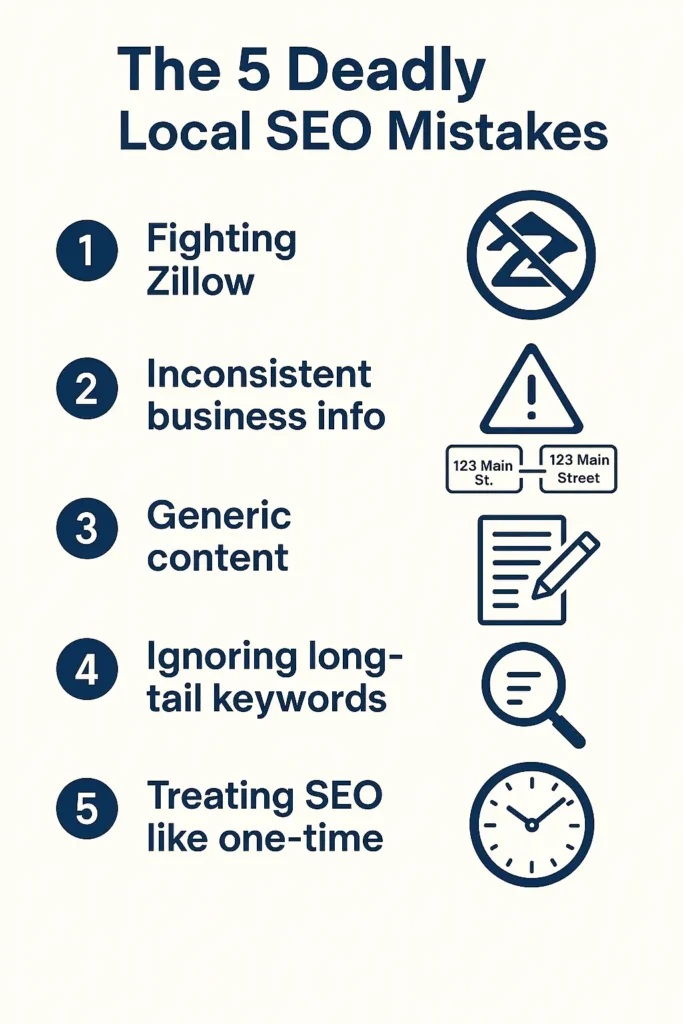
Before we dive into what works, let’s fix what’s broken. I see these mistakes over and over, and they’re absolutely crushing agents’ online visibility:
📋 Agent Mistakes I See Weekly Just last month, I audited a top-producing agent’s website and found her business listed 47 different ways across the web. Her Google Business Profile said “Phoenix,” her website footer said “Phoenix, AZ,” and Yelp had “Phoenix, Arizona.” Google was so confused, she wasn’t showing up for searches happening three blocks from her office.
Mistake #1: Fighting Zillow on Their Turf
Stop trying to outrank Zillow for “Phoenix homes for sale.” It’s not happening. They spend millions on SEO and have domain authority you’ll never match. Instead, focus on what they can’t do: provide deep, personal neighborhood expertise.
Mistake #2: Inconsistent Business Information Everywhere
This is the fastest way to confuse Google and tank your rankings. If your Google Business Profile says “123 Main St” but your website says “123 Main Street,” Google doesn’t know which to trust. Fix this immediately.
Mistake #3: Creating Generic “Could Be Anywhere” Content
I’ve seen agents write blog posts about “spring home buying tips” that could apply to any city in America. That’s not local expertise. That’s filler content, and Google knows the difference.
Mistake #4: Ignoring the Goldmine of Long-Tail Keywords
While everyone fights over “real estate agent Phoenix,” smart agents are ranking for “best neighborhoods for young families in Tempe near ASU.” Less competition, more qualified traffic.
Mistake #5: Treating SEO Like a One-Time Project
Local SEO isn’t a “set it and forget it” strategy. It requires consistent effort, fresh content, and ongoing optimization. The agents winning online treat it like the business-building activity it is.
Now that you know what’s holding most agents back, let’s look at what actually works.
The Complete Local SEO Keyword Strategy That Actually Works
Let’s get tactical. Here’s the exact framework I use with clients to identify and target keywords that generate real leads:
📊 Keyword Tiers Quick Reference
| Tier | Competition | Time to Rank | Conversion Rate | Examples |
|---|---|---|---|---|
| Neighborhood-Level | Low-Medium | 2-4 months | High | “Scottsdale Ranch homes” |
| Lifestyle-Focused | Medium | 3-6 months | Very High | “Family neighborhoods with pools” |
| Property-Specific | Low | 1-3 months | High | “Phoenix townhomes under $400K” |
| Service-Based | Medium | 4-8 months | Medium | “Phoenix buyer’s agent” |
Tier 1: Neighborhood-Level Keywords (Your Sweet Spot)
This is where individual agents can compete and win. Instead of targeting broad city terms, focus on specific neighborhoods, subdivisions, and local areas:
High-Converting Examples: • “Homes for sale in Scottsdale Ranch” • “Paradise Valley luxury real estate” • “Downtown Phoenix loft condos” • “Ahwatukee family neighborhoods”
Why This Works: National portals like Zillow struggle to create truly hyperlocal content for every neighborhood. You live and work there. You have the insider knowledge they can’t scale.
Tier 2: Lifestyle and Demographic Keywords
People don’t just buy houses; they buy lifestyles. Target the specific needs and preferences of your ideal clients:
Lifestyle-Focused Keywords: • “Pet-friendly apartments downtown Phoenix” • “Walkable neighborhoods Tempe” • “Homes near top-rated schools Chandler” • “Senior-friendly communities Scottsdale” • “First-time buyer programs Mesa”
Pro Tip: These keywords often have less competition but higher conversion rates because they target people with specific, urgent needs.
2025 Game Changer: AI-Powered Search and Google’s SGE
Here’s what most agents don’t realize yet: Google’s Search Generative Experience (SGE) and AI-powered search are completely changing the local SEO landscape. When someone asks, “What’s the best neighborhood for young families in Phoenix?” Google’s AI now provides direct answers sourced from local content.
This means your hyperlocal content needs to be comprehensive, accurate, and structured to feed these AI responses. The agents who understand this shift will capture traffic that never even clicks through to traditional search results.
Tier 3: Property Type and Price Point Keywords
Get specific about what you’re selling and who you’re selling to:
Property-Specific Examples: • “Phoenix townhomes under $400K” • “Luxury homes over $1M Scottsdale” • “Historic homes downtown Phoenix” • “New construction Chandler” • “Investment properties Tempe”
Tier 4: Service-Based Local Keywords
Don’t forget about your services. People aren’t just searching for properties; they’re searching for expertise:
Service Keywords: • “Phoenix home appraisal services” • “Scottsdale buyer’s agent” • “Short sale specialist Mesa” • “Military relocation specialist Phoenix” • “Luxury home marketing Scottsdale”
The Step-by-Step Implementation Guide
Now let’s turn this knowledge into action. Here’s your roadmap to local SEO domination:
Step 1: Audit Your Current Situation
Before you can improve, you need to know where you stand:
Check Your Google Business Profile: • Is all information complete and accurate? • Do you have recent, high-quality photos? • Are you responding to reviews promptly? • Are you posting regular updates?
Review Your Website: • Does every page have a clear location focus? • Are your contact details identical everywhere? • Do you have dedicated pages for each neighborhood you serve?
Analyze Your Competition: Search for your target keywords and see who’s ranking. What are they doing that you’re not?
Step 2: Create Your Keyword Blueprint
Don’t just guess at keywords. Use this systematic approach:
Research Tools to Use: • Google Keyword Planner (free baseline data) • Google autocomplete (type your service + location and see what suggestions appear) • Answer The Public (great for question-based searches) • Local Facebook groups and NextDoor (see what people actually ask about)
The 80/20 Keyword Rule: • 80% of your focus: Long-tail, neighborhood-specific keywords • 20% of your focus: Broader city-level terms for authority building
Once you’ve identified your target keywords, it’s time to optimize where it matters most.
Step 3: Optimize Your Google Business Profile Like a Pro
Your Google Business Profile is often the first thing people see, so make it count:
Complete Every Section: • Business description with natural keyword integration • Service areas (be specific about neighborhoods) • Business hours (including holiday hours) • Attributes (women-owned, veteran-owned, etc.)
Regular Content Updates: • Weekly posts about local market conditions • New listing announcements • Community event coverage • Market insights and tips
Photo Strategy: • Professional headshots • Office photos • Neighborhood photos showing local knowledge • Before/after staging photos • Team photos for larger brokerages
Now let’s create content that separates you from every other agent in your market.
Step 4: Build Location-Specific Website Content
This is where you separate yourself from the competition. Create content that only a true local expert could write:
Neighborhood Pages That Convert: • Current market statistics and trends • Local amenities and attractions • School district information • Transportation and commute details • Recent sales and price trends • Why you love working in this area (personal touch)
Blog Content Ideas: • Monthly market reports by neighborhood • “Living in [Neighborhood]” guides • Local business spotlights • Community event coverage • Seasonal market insights
Step 5: Master the Technical Stuff (Don’t Worry, It’s Easier Than You Think)
On-Page SEO Basics: • Include your primary keyword in the page title • Use location-based keywords in headings (H1, H2, H3) • Write compelling meta descriptions that include your location • Add location keywords to image alt text • Include your NAP (Name, Address, Phone) on every page
Schema Markup: This is code that helps Google understand your content better. If you’re not technical, ask your web developer to add LocalBusiness and RealEstate schema to your site.
Perfect. Now you’ve got the foundation. Let’s explore the advanced tactics that create real competitive advantages.
Quick Wins vs. The Long Game: Your SEO Timeline
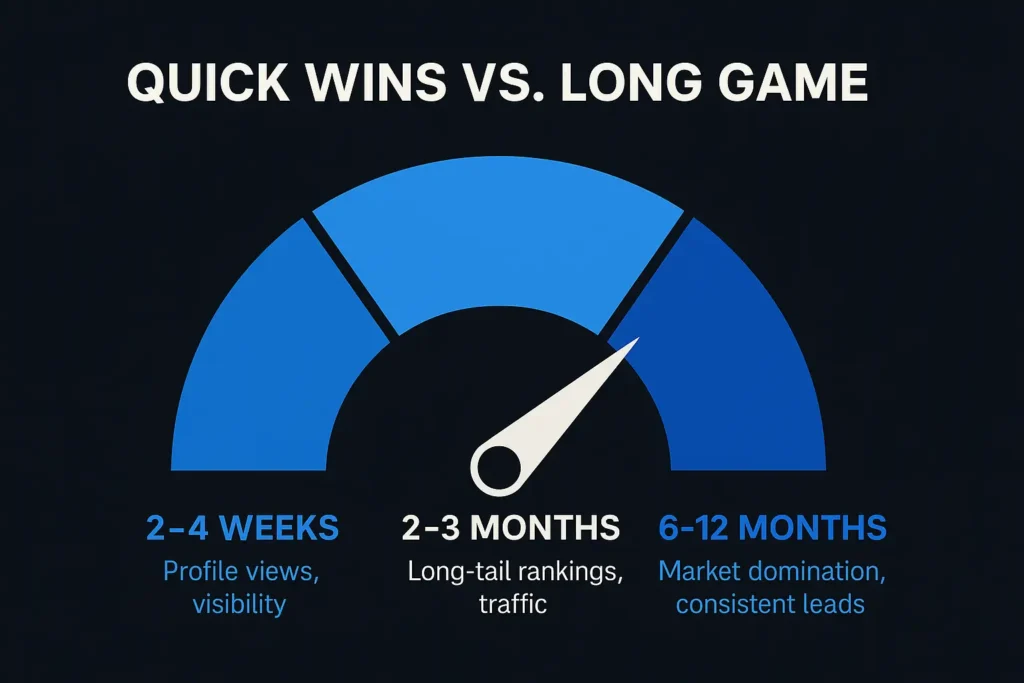
Let’s be honest about timelines. If you need leads tomorrow, SEO isn’t your answer (try Facebook ads). But if you want sustainable, compound growth, here’s your realistic timeline:
⚡ Quick Wins (2-4 weeks)
What to focus on: • Google Business Profile optimization • NAP consistency fixes across all platforms • Basic on-page SEO for existing pages • Review generation system setup
Expected results: Improved local pack visibility, more profile views
🎯 Mid-Term Results (2-3 months)
What to focus on: • Neighborhood-specific landing pages • Weekly local content creation • Long-tail keyword optimization • Local citation building
Expected results: Rankings for low-competition local keywords, increased organic traffic
🏆 Long Game Domination (6-12 months)
What to focus on: • Authority content creation • Video SEO and virtual tours • Local backlink building • Market expertise positioning
Expected results: Top rankings for competitive terms, consistent lead generation
Advanced Strategies That Set You Apart
Once you’ve mastered the basics, here are the advanced tactics that create true competitive advantages:
Hyper-Local Content Marketing
Create content that only someone with deep local knowledge could produce:
Market Micro-Analysis: Instead of broad city reports, create detailed analyses for specific subdivisions or even street-by-street insights.
Local Partnership Content: Collaborate with local businesses, schools, and community organizations to create valuable content that showcases your community connections.
Video Walk-Throughs: Create neighborhood walking tours, local business features, and “Day in the Life” videos that show your local expertise.
If you’re still using the same “spring home tips” blog every year, you’re leaving money on the table. Here’s how to leverage reviews strategically.
Review Strategy That Builds Authority
Reviews aren’t just nice to have; they’re a crucial ranking factor:
Systematic Review Generation: • Send follow-up emails with direct links to review platforms • Include review requests in your closing gifts • Ask satisfied clients to mention specific neighborhoods or services
Review Response Best Practices: • Respond to every review, positive and negative • Include location-specific details in responses • Thank reviewers and mention specific neighborhoods or services
Citation Building and Local Directory Optimization
Ensure your business information is consistent across the web:
Essential Directories: • Zillow, Realtor.com, Trulia (if you’re on these platforms) • Yelp, Better Business Bureau • Local chamber of commerce directories • Industry-specific directories like REALTOR.org
Consistency is Key: Use the exact same business name, address, and phone number format everywhere. Even small variations can confuse search engines.
Now, let’s make sure you’re tracking what actually matters for your business growth.
Essential Local SEO Tools for 2025
Here are the tools that actually move the needle for real estate agents:
🆓 Free Tools (Start Here)
Google Search Console – Monitor your search performance and catch technical issues How agents should use it: Check weekly for ranking changes and click-through rates on your top pages
Google Business Profile Insights – Track profile views, clicks, and calls How agents should use it: Monitor which posts drive the most engagement and calls
Google Keyword Planner – Basic keyword research and search volume data How agents should use it: Validate search volume for neighborhood-specific keywords
💰 Paid Tools (Invest as You Grow)
BrightLocal ($29/month) – Local SEO auditing and rank tracking How agents should use it: Monthly local search ranking reports for your target neighborhoods
Ahrefs ($99/month) – Comprehensive SEO analysis and competitor research How agents should use it: Analyze what keywords your top competitors rank for that you don’t
CallRail ($45/month) – Call tracking and lead attribution How agents should use it: Track which SEO efforts generate actual phone leads
Screaming Frog ($259/year) – Technical SEO auditing How agents should use it: Quarterly technical audits to catch issues that hurt rankings
Measuring Success: KPIs That Actually Matter
Don’t just guess whether your SEO is working. Track these metrics:
Rankings and Visibility
• Local pack rankings for target keywords • Organic search positions • Google Business Profile views and clicks
Traffic and Engagement
• Organic traffic from local searches • Time spent on neighborhood pages • Contact form submissions and phone calls
Lead Quality and Conversion
• Lead source tracking (which keywords generate the best clients) • Cost per lead compared to paid advertising • Client lifetime value by acquisition channel
Tools for Tracking Success
• Google Analytics (set up location-based segments) • Google Search Console (monitor search performance) • Google Business Profile insights • Local ranking tools like BrightLocal
Stop making these common mistakes that sabotage months of SEO work.
Common Pitfalls and How to Avoid Them
Learn from others’ mistakes:
Content Mistakes
Don’t: Write generic content that could apply anywhere Do: Create hyperlocal content that demonstrates genuine neighborhood knowledge
Don’t: Stuff keywords unnaturally into content Do: Use keywords naturally while focusing on providing value
Technical Mistakes
Don’t: Ignore mobile optimization Do: Ensure your site loads quickly and works perfectly on phones
Don’t: Forget about site speed Do: Optimize images and minimize plugins for fast loading times
Business Profile Mistakes
Don’t: Set up your profile and forget about it Do: Post regularly and engage with reviews and questions
Here’s your step-by-step roadmap to implementation.
Your 90-Day Local SEO Action Plan
📋 Days 1-30: Foundation Building Checklist
- [ ] Complete Google Business Profile audit and optimization
- [ ] Fix NAP inconsistencies across all online directories
- [ ] Conduct keyword research for top 3 target neighborhoods
- [ ] Create 3 high-quality neighborhood landing pages
- [ ] Set up Google Analytics and Search Console tracking
- [ ] Implement review generation system
📋 Days 31-60: Content & Authority Building
- [ ] Publish weekly blog posts with local focus
- [ ] Create first monthly neighborhood market report
- [ ] Build 15-20 local citations and directory listings
- [ ] Start video content (neighborhood tours, market updates)
- [ ] Engage with local community groups online
- [ ] Launch systematic review collection process
📋 Days 61-90: Advanced Optimization & Growth
- [ ] Analyze performance data and identify top-performing content
- [ ] Expand content to cover 2-3 additional neighborhoods
- [ ] Build relationships with local businesses for cross-promotion
- [ ] Implement advanced schema markup
- [ ] Create comprehensive local business partnership strategy
- [ ] Plan expansion into adjacent service areas
Problem-Solving FAQ Section
Q: How long before I see results from local SEO?
The Reality: Local SEO is like planting a tree. You won’t see fruit tomorrow, but when it grows, it feeds you for years.
Typically, you’ll start seeing improvements in Google Business Profile visibility within 4-6 weeks. Organic search rankings for low-competition, neighborhood-specific keywords can improve within 2-3 months. However, competitive city-level keywords might take 6-12 months or more.
The key is consistency. I’ve seen agents give up after two months, right before their rankings were about to take off. Don’t be that agent.
Q: Should I focus on one neighborhood or try to rank for the entire city?
The Smart Approach: Start hyperlocal, then expand.
Pick 2-3 neighborhoods where you already have experience, connections, or personal knowledge. Dominate those first. It’s better to be #1 for “homes in Paradise Valley” than #50 for “Phoenix real estate.”
Once you’re ranking well for your core neighborhoods, gradually expand to adjacent areas. This builds authority systematically rather than spreading your efforts too thin.
Q: How do I compete with Zillow and the big portals?
The Truth: You don’t compete with them head-to-head. You outflank them.
Zillow dominates broad searches because they have massive resources and authority. But they can’t provide the hyperlocal, personal expertise that you can. Focus on:
• Neighborhood-specific content they can’t scale • Personal insights about schools, commutes, and local life • Real-time market knowledge from active practice • Community connections and involvement
Q: What if I serve multiple cities or a large geographic area?
The Strategy: Create separate location-focused content for each area.
Don’t try to stuff multiple cities into one page. Create dedicated pages and content for each city or major neighborhood you serve. Each should have:
• Unique, locally-relevant content • Market data specific to that area • Testimonials from clients in that area • Your experience and knowledge of that specific market
Q: How many keywords should I target per page?
The Best Practice: One primary keyword and 2-3 related secondary keywords per page.
For example, a “Scottsdale Ranch Homes” page might target: • Primary: “Scottsdale Ranch homes for sale” • Secondary: “Scottsdale Ranch real estate,” “homes in Scottsdale Ranch,” “Scottsdale Ranch neighborhood”
This allows you to create comprehensive, focused content without keyword stuffing.
Q: Is it worth paying for SEO tools, or can I do this for free?
The Balanced Approach: Start free, then invest as you grow.
Free tools that provide real value: • Google Keyword Planner • Google Search Console • Google Analytics • Google autocomplete and “People Also Ask”
As your business grows, consider investing in tools like: • Ahrefs or SEMrush for competitor analysis • BrightLocal for local ranking tracking • Screaming Frog for technical SEO audits
Q: How important are online reviews for local SEO?
Critical Importance: Reviews are one of the top three local ranking factors.
Google considers review quantity, quality, and recency when determining local search rankings. But beyond SEO, reviews build trust with potential clients.
Action Steps: • Aim for 2-4 new reviews monthly • Respond to all reviews professionally • Ask satisfied clients to mention specific neighborhoods or services • Never buy fake reviews (Google will catch you and penalize your rankings)
Q: Should I create separate websites for different markets I serve?
Usually Not Recommended: One strong website typically performs better than multiple weak ones.
Instead of separate websites, create comprehensive location pages within your main site. This concentrates your SEO authority and is easier to maintain.
Exception: If you serve markets that are 50+ miles apart or have completely different demographics, separate websites might make sense.
Q: What’s the biggest mistake agents make with local SEO?
The #1 Mistake: Treating it like a one-time project instead of an ongoing business activity.
SEO isn’t like painting your house where you do it once and you’re done. It requires consistent effort: • Regular content creation • Ongoing optimization • Continuous monitoring and adjustment • Staying current with algorithm changes
Agents who succeed treat local SEO like they treat prospecting, essential and ongoing.
Q: How do I track if my SEO efforts are actually generating leads?
Set Up Proper Tracking:
• Use Google Analytics to track organic traffic and goal completions • Set up call tracking numbers to measure phone leads • Create unique landing pages for different keyword campaigns • Use UTM parameters to track which content generates leads • Monitor Google Business Profile insights for calls and direction requests
Key Metrics to Watch: • Organic traffic growth • Local search visibility improvements • Lead quality and conversion rates • Cost per lead compared to paid advertising
Q: What should I do if my rankings drop suddenly?
Don’t Panic, Investigate:
Rankings can fluctuate for many reasons: • Google algorithm updates • Increased local competition • Technical website issues • Changes in search behavior
Action Steps:
- Check Google Search Console for any penalties or issues
- Verify your Google Business Profile information hasn’t changed
- Review recent website changes that might have caused problems
- Monitor competitor activity and adjust your strategy accordingly
- Continue creating quality, local-focused content consistently
Your Next Steps to Local SEO Domination
Local SEO isn’t just about ranking higher in search results. It’s about becoming the recognized authority in your local market, building trust with potential clients before you ever meet them, and creating a lead generation system that works while you sleep.
The agents who implement these strategies consistently over the next 6-12 months will have a massive competitive advantage. They’ll capture the majority of online leads in their market while their competitors continue to rely on expensive advertising and cold prospecting.
Start with the basics: optimize your Google Business Profile, audit your website for local optimization, and begin creating hyperlocal content that showcases your neighborhood expertise.
Remember, you don’t have to implement everything at once. Pick the strategies that align best with your current resources and start there. Consistency beats perfection every time.
The leads are out there searching for real estate help in your market right now. The question is: will they find you first, or will they find your competition?
Your future success depends on the actions you take today. Choose to dominate your local market through strategic SEO, and watch as your business transforms from chasing leads to attracting them naturally.
The real estate agents who will thrive in the coming years are those who understand that online visibility isn’t optional anymore, it’s essential. Make sure you’re one of them.

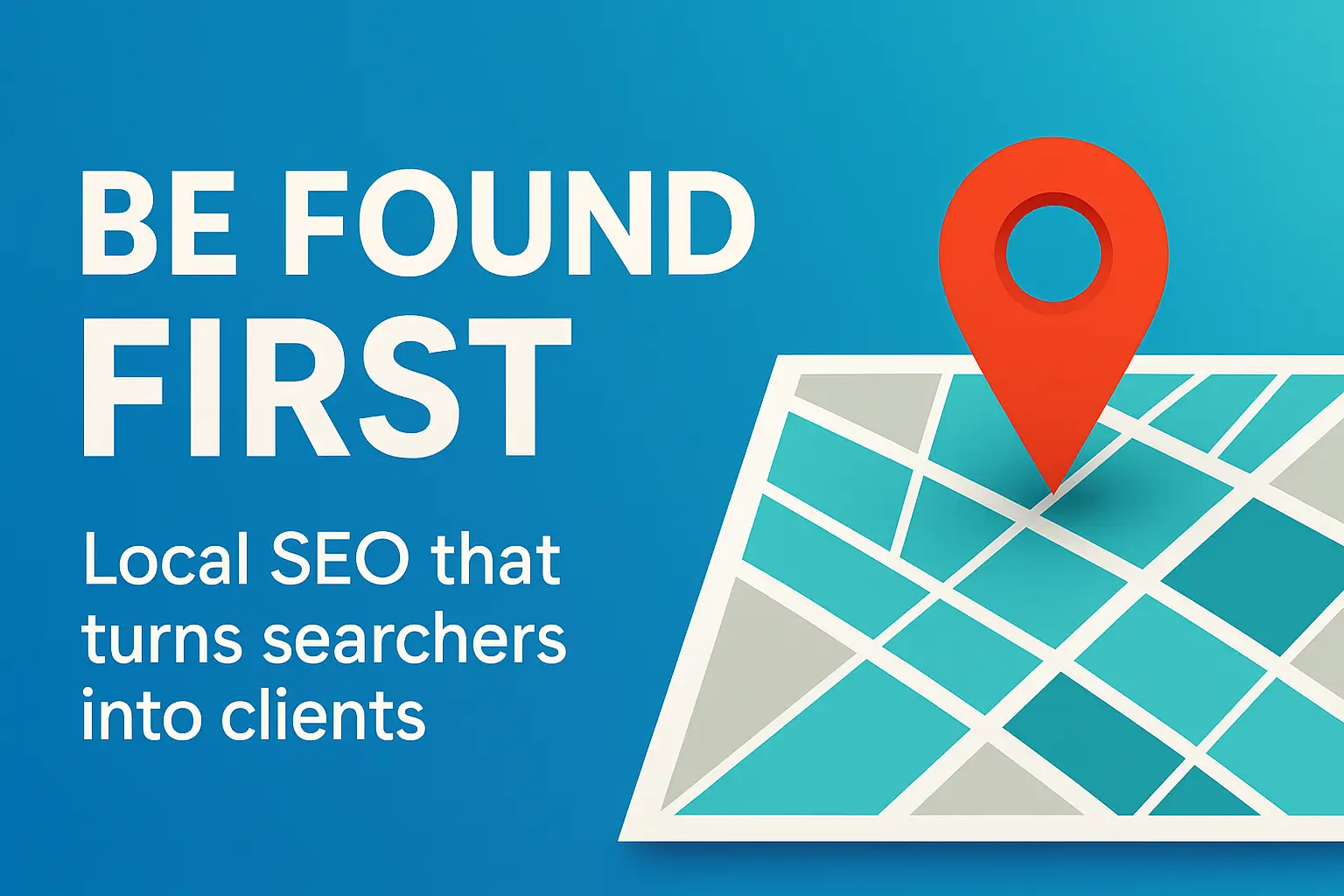
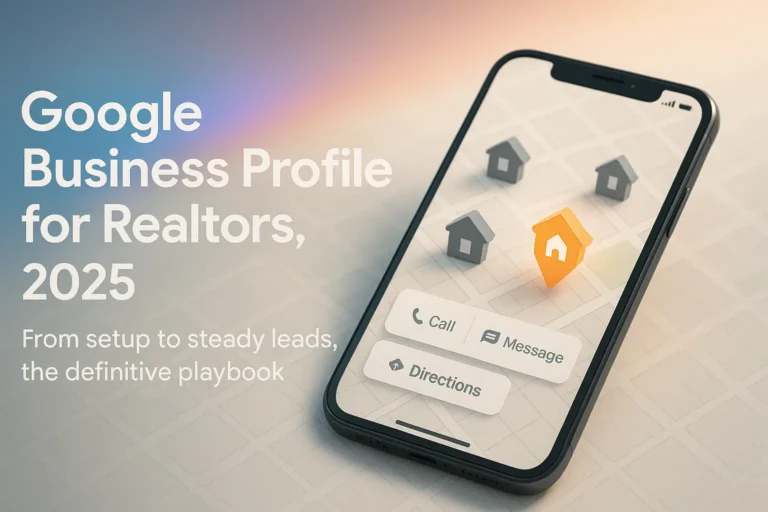
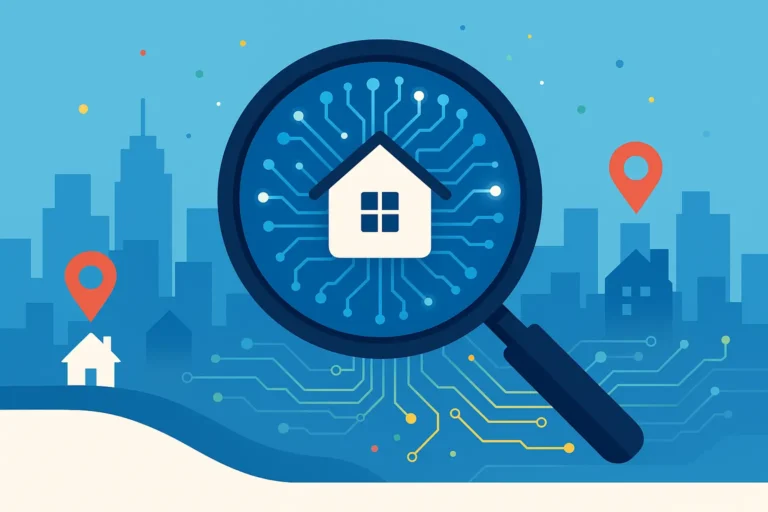
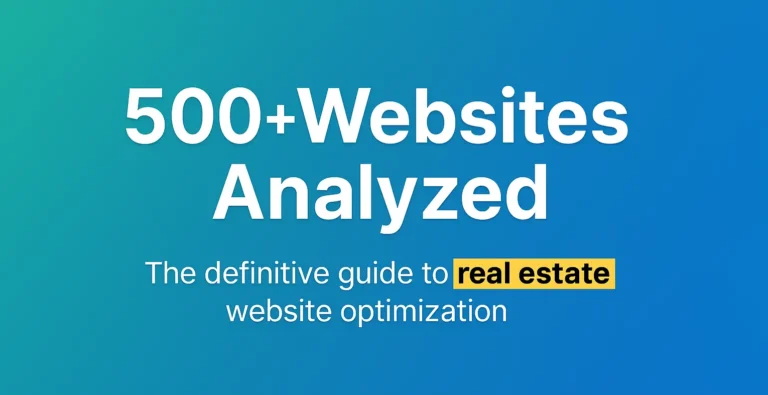

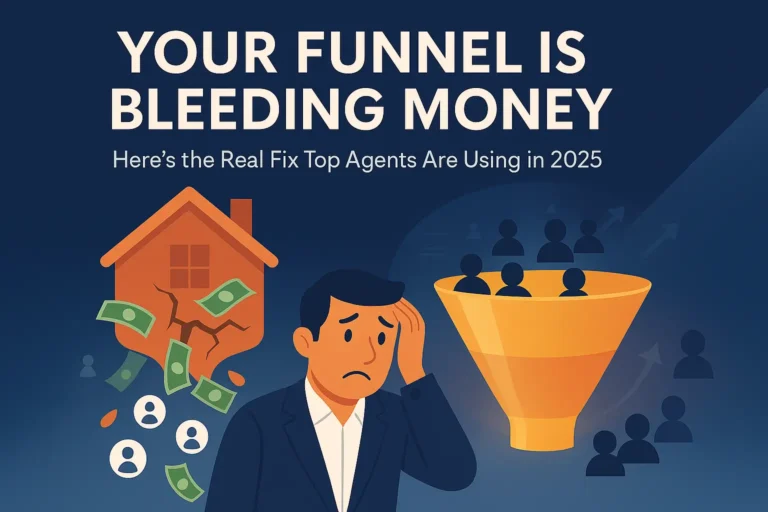
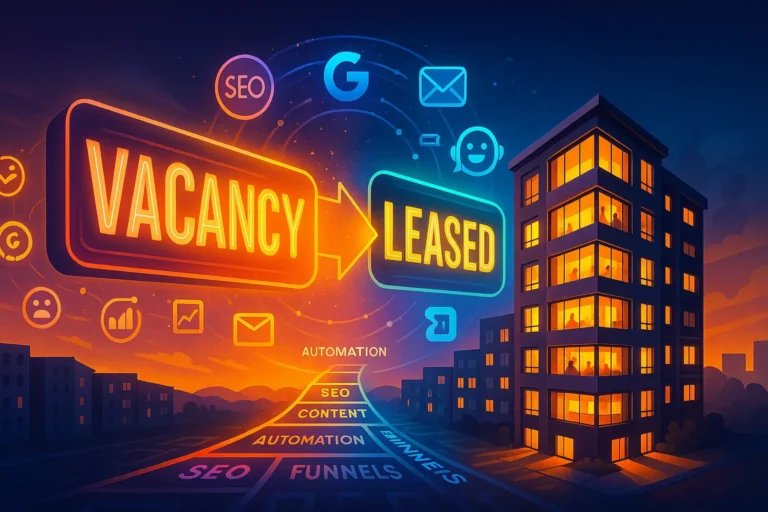
2 Comments